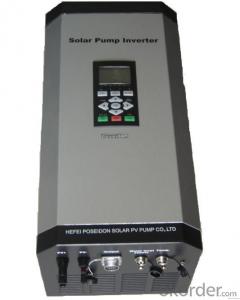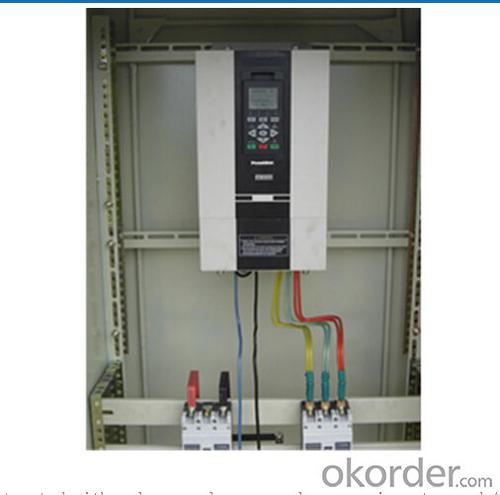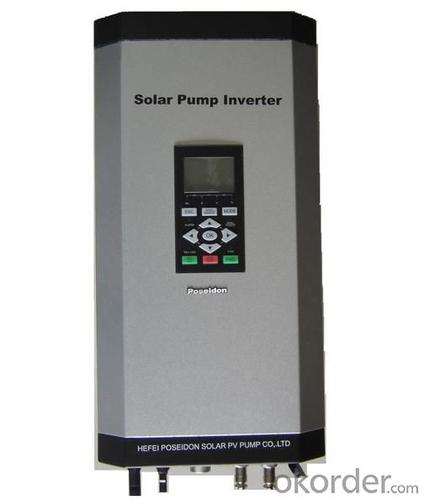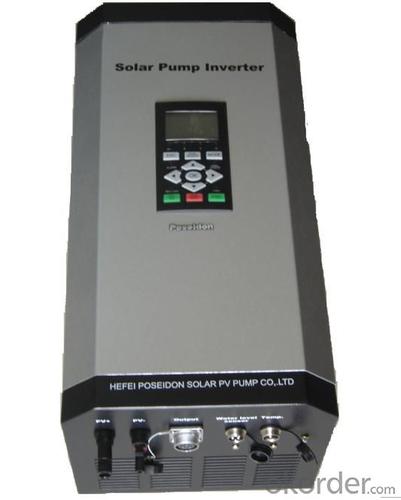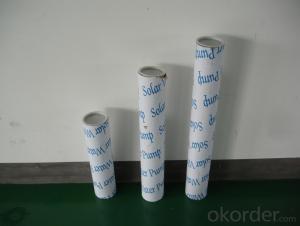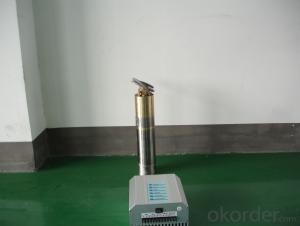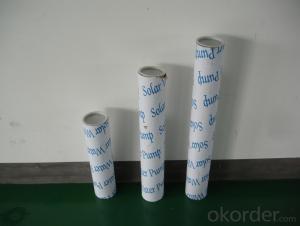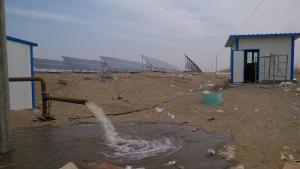Solar Pump for Well FCPM55KH Inverter
- Loading Port:
- China Main Port
- Payment Terms:
- TT OR LC
- Min Order Qty:
- -
- Supply Capability:
- -
OKorder Service Pledge
Quality Product, Order Online Tracking, Timely Delivery
OKorder Financial Service
Credit Rating, Credit Services, Credit Purchasing
You Might Also Like
Solar pump inverter FCPM55KH Product Description:
Solar water pumping system is constructed with solar panel array,solar pump inverter and AC water pump, DC current produced from solar panel will be delivered to solar pump inverter,and it will convert it into AC current to drive water pump,and will automatically regulate output frequency according to sun radiance intensity,maximally realize MPPT tracking function.
Features
Adopting the proposed dynamic VI maximum power point tracking (MPPT) control method, with fast response, and reliable operation, achieves efficiency of 99%.
Designed with variable frequency driver, greatly improves efficiency
Extremely high efficiency
Digital mode control, with automatic operation and manual operation mode options
Complete protection functions
Adopts intelligent IPM module, with high reliability
LCD display and operation panel, in real time presents operating data
Optional for water level measurement and control circuit
Applicable for general ACC pumps, like centrifugal pump, piston pump etc.
Independent intellectual property; Highly effective, the redundant reliability, exempts the maintenance and the long life.
The pumps are soft started, fully protected.
No batteries are used. So better Sunlight, more water.
Datasheet.
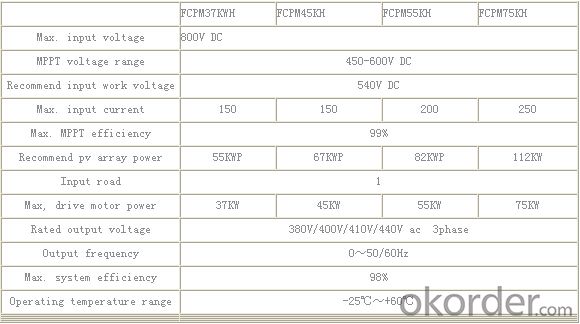
- Q: Can a solar pump be used for fountains and decorative water features?
- Yes, a solar pump can definitely be used for fountains and decorative water features. Solar pumps are designed to operate using energy from the sun, eliminating the need for electricity or batteries. They are environmentally friendly and cost-effective, making them an excellent choice for powering fountains and water features.
- Q: Can solar pumps be used for water supply in hospitals or healthcare facilities?
- Yes, solar pumps can be used for water supply in hospitals or healthcare facilities. Solar pumps are reliable, cost-effective, and environmentally friendly, making them an ideal choice for providing a consistent water supply in such critical settings. Additionally, solar pumps can be easily integrated into existing infrastructure and can operate efficiently even in remote or off-grid locations, ensuring uninterrupted water supply for essential healthcare services.
- Q: How does the performance of a solar pump vary with different water sources (e.g., well, river, lake)?
- The performance of a solar pump can vary depending on the water source it is being used with, such as a well, river, or lake. When it comes to using a solar pump with a well as the water source, the performance is generally favorable. Wells tend to have consistent water levels, which allows for a steady and reliable output from the solar pump. The depth of the well, the flow rate, and the quality of the water can also affect the performance of the pump. However, as long as the solar pump is properly sized and designed for the well, it can provide an efficient and sustainable solution for pumping water. On the other hand, using a solar pump with a river as the water source can present some challenges. Rivers are highly dependent on rainfall and can have fluctuating water levels. During dry seasons or droughts, the flow rate of a river can decrease significantly, which may impact the performance of the solar pump. Additionally, rivers may carry sediment, debris, or contaminants, which can affect the efficiency and lifespan of the pump. Proper filtration and maintenance measures are essential when using a solar pump with a river as the water source. Similarly, using a solar pump with a lake as the water source has its own set of considerations. Lakes can have varying water levels depending on the season, rainfall, and other factors. If the lake experiences significant fluctuations in water level, it may affect the performance of the solar pump. Additionally, the quality of the water in the lake, such as the presence of algae, sediment, or other pollutants, can impact the efficiency and longevity of the pump. Adequate filtration and regular maintenance are crucial in such cases. In summary, the performance of a solar pump can be influenced by the characteristics and conditions of the water source, whether it is a well, river, or lake. Proper sizing, design, filtration, and maintenance are key factors in ensuring the optimal performance and longevity of a solar pump, regardless of the water source.
- Q: How does the water quality affect the performance of a solar pump?
- The water quality can significantly impact the performance of a solar pump. Poor water quality, such as high levels of sediment, minerals, or contaminants, can cause clogging and damage to the pump's components, leading to reduced efficiency and decreased lifespan. Additionally, certain water quality issues like high salinity or acidity can corrode the pump's materials, further affecting its performance. Therefore, maintaining good water quality is crucial to ensure optimal functioning and longevity of a solar pump.
- Q: How do I maintain the efficiency of a solar pump over time?
- To maintain the efficiency of a solar pump over time, there are several key steps you can take: 1. Clean and inspect the solar panels regularly: Dust, dirt, and debris can accumulate on the solar panels, reducing their efficiency. Clean them with a soft cloth or brush and ensure there are no obstructions blocking sunlight. Regularly inspect the panels for any damage or cracks that may affect their performance. 2. Ensure proper positioning and orientation: Make sure the solar panels are installed in an area where they receive maximum sunlight exposure throughout the day. Position them at the optimal tilt and angle based on your geographical location. Regularly check and adjust the panel orientation if necessary to maximize energy absorption. 3. Monitor and maintain battery health: Solar pumps often rely on batteries to store excess energy generated during the day for use during cloudy or low-light conditions. Monitor the battery levels regularly and ensure they are properly charged. Clean the battery terminals and connections to prevent corrosion. Replace old or damaged batteries to maintain optimum efficiency. 4. Check and maintain the pump system: Inspect the pump regularly for any leaks, clogs, or damaged components. Clean or replace the filter to prevent blockages and ensure smooth water flow. Lubricate moving parts if needed. Regularly check and tighten any loose connections in the pump system. 5. Protect from extreme weather conditions: Solar pumps can be affected by extreme weather conditions such as hail, heavy rain, or freezing temperatures. If possible, install protective covers or enclosures to shield the pump and panels from such conditions. During winter, drain the pump system and protect it from freezing by using insulation or heat sources. 6. Seek professional maintenance when needed: If you notice any significant drop in efficiency or encounter technical issues, it is advisable to seek professional help. An experienced technician can diagnose and fix any problems, ensuring that your solar pump operates at its optimum efficiency. By following these maintenance practices, you can extend the lifespan of your solar pump and ensure its efficiency over time.
- Q: How does the elevation of the installation site affect the performance of a solar pump?
- The elevation of the installation site can significantly affect the performance of a solar pump. As the elevation increases, the atmospheric pressure decreases, resulting in a decrease in the boiling point of water. This can cause the pump to work less efficiently, as the lower boiling point can lead to the formation of air bubbles in the system, reducing its pumping capacity. Additionally, higher elevations may also lead to a decrease in sunlight intensity, reducing the solar pump's overall power output. Therefore, careful consideration of the installation site's elevation is essential to ensure optimal performance of a solar pump.
- Q: How does the water level affect the performance of a solar pump?
- The performance of a solar pump is heavily influenced by the water level. The depth of the water source from which the pump draws water directly affects how well it operates. If the water level is too low, indicating that the water source has dried up or is greatly depleted, the solar pump will struggle to effectively draw water. As a result, its performance will decline. It may have difficulty lifting the water to the required height or, in severe cases, be unable to pump any water at all. Consequently, the pump's flow rate and pressure will decrease, negatively impacting its ability to efficiently deliver water. Conversely, if the water level is sufficient and falls within the pump's rated capacity, the solar pump will perform optimally. It will draw water efficiently, maintain a consistent flow rate, and deliver water at the desired pressure. This ensures that the pump operates efficiently and meets the necessary demand for water. It is essential to note that continuously operating a solar pump at its maximum depth limit can also affect its performance. Drawing water from a deeper source necessitates the pump working harder, which can result in increased wear and tear, reduced lifespan, and potentially higher maintenance and operational costs. To summarize, the water level has a direct impact on the performance of a solar pump. Maintaining an adequate water level guarantees optimal performance, while low water levels can significantly hinder the pump's ability to deliver water effectively. Proper monitoring and management of water levels are critical for ensuring the efficient operation of a solar pump.
- Q: Can a solar pump be used for livestock watering?
- Yes, a solar pump can be used for livestock watering. Solar pumps are a sustainable and cost-effective solution for providing water to livestock in remote areas where electricity may not be readily available. These pumps harness energy from the sun to power their operation, making them an environmentally friendly option. They can be used to pump water from wells, boreholes, or other water sources to provide a reliable supply for livestock watering.
- Q: What is the average lifespan of a solar pump controller?
- The average lifespan of a solar pump controller can vary depending on various factors such as quality, usage, maintenance, and environmental conditions. However, a well-maintained and high-quality solar pump controller can typically last anywhere from 10 to 15 years.
- Q: How does a solar pump handle water level fluctuations in wells or boreholes?
- A solar pump handles water level fluctuations in wells or boreholes by using sensors and controls to adjust its operation based on the water level. When the water level drops below a certain threshold, the pump slows down or shuts off to prevent dry running and potential damage. Once the water level rises to a safe level, the pump resumes its normal operation. This intelligent system ensures efficient and reliable water pumping while protecting the pump and the well or borehole from harm.
Send your message to us
Solar Pump for Well FCPM55KH Inverter
- Loading Port:
- China Main Port
- Payment Terms:
- TT OR LC
- Min Order Qty:
- -
- Supply Capability:
- -
OKorder Service Pledge
Quality Product, Order Online Tracking, Timely Delivery
OKorder Financial Service
Credit Rating, Credit Services, Credit Purchasing
Similar products
Hot products
Hot Searches
Related keywords


